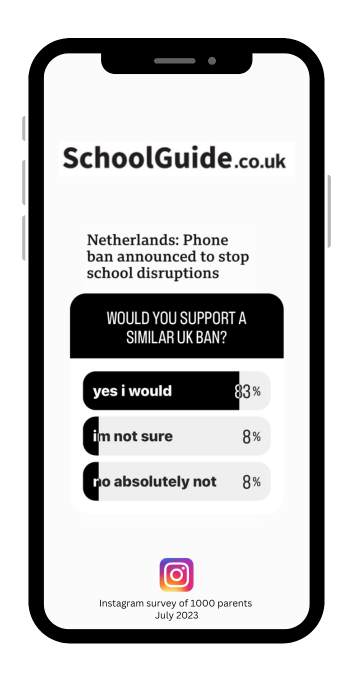Why schools need stricter mobile phone regulations

We’ve had the tigers, helicopters and snowploughs; now there’s a new breed of parents at the school gates and they are quietly growing in numbers. So-called holdout parents are closing ranks to wait until after primary school to give their child access to a smartphone.
Data collected by Ofcom reports that smartphone ownership jumps from 44% at age 9 to 91% at age 11. But mobile phone usage is creeping earlier – it’s estimated that 17% of 3-4 year olds owned their own phone in 2022 – and research shows access at a young age to always-on apps is linked to lower self-worth and lack of motivation as adults.
Holding out until age 11 is almost as hard as a Year 6 SATs paper – and it’s getting harder.
Many parents feel it’s not helped by a lack of consistency on mobile phone policies in schools. In 2021, the government announced it was planning a blanket ban on smartphones in schools. While supported by some, The Association of School and College Leaders condemned the plan as outdated and said many schools already had pupil phone use under control.
So, the Department for Education u-turned and said headteachers could set their own mobile phone policies.
The result is that there is a genuine lack of firm government guidance and regulation, which puts extra pressure on schools to plan their own policing and leaves parents uncertain on how much phone use is monitored during the school day. This needs to change.
Countries where phones banned in classrooms
It’s a very different story to France, where all children up to the age of 15 have to keep their phone out of sight while on school grounds. In China, children can only take phones into school with written parental consent. Classrooms are free from the distraction from what one leading neuroscientist has branded “pocket-sized black holes of attention.”
Just last week, the Netherlands announced that mobile phones and other smart devices such as smart watches will no longer be permitted in classrooms in schools from 1 January 2024. While the ban is not currently legally enforceable, reports suggest that it may become so in the future. “Even though mobile phones are almost intertwined with our lives, they do not belong in the classroom," said Education Minister Robbert Dijkgraaf.
There is a genuine lack of firm government guidance and regulation, which puts extra pressure on schools to plan their own policing and leaves parents uncertain on how much phone use is monitored during the school day.
Victoria Bond, School Guide Founder
83% parents support mobile phone ban in schools
School Guide ran an Instagram poll and 1,000 parents polled replied 83% support a ban on phones in schools.
The real danger from distracting phones, according to experts
While the risks of corridor cyberbullying and lesson disruption from ‘I’ve Got A Text’ pings are concerning, experts suggest the real danger from smartphones in schools is from rapid-switch-tasking. A quick break from the board to check DMs under the desk may seem harmless, but effective learning is disrupted as the brain switches modes. New research even suggests that just the thought of checking a phone if it’s within reach, is enough to throw off focus.
A number of secondary schools have already introduced gate-to-gate policies whereby phones should not be seen or heard during the school day. If the rules are broken, phones are taken away and centrally stored to be returned at the gate – to positive effect. Young brains are hard-wired to take risks but they also respond well to boundaries that set the kind of healthy limits and structure they can’t set for themselves.
The Children’s Commissioner, Dame Rachel de Souza, has said that “we will look back in 20 years’ time and be absolutely horrified by what we allowed our children to be exposed to.” She was highlighting the dangers of social media but the principle that we need to protect our children is the same. It seems unfathomable now that teachers smoked in schools. Will history teach us similar lessons in terms of tech?
I rarely advocate a one-size-fits-all approach, but we'll only crack this by working together in the fight against smartphones’ stealing of our children’s attention. While the government refuses to take charge, our schools have a massive opportunity to be a sanctuary and, ironically, give childrens’ brains a break.
Certainly I see more parents asking schools about mobile phone policies at open days. Homes in the catchment area of high performing schools command a premium price tag. I predict that in a few years, schools that refuse to feed the next generation’s phone addiction will become equally sought-after.
How to check a school's mobile phone policy
Each school will have its own policy and parents can find this on the school’s website. However, with so many demands on senior school leadership teams, the headteacher will determine how much they wish to pick this particular battle with pupils. Don’t be afraid to put your hand up and ask them directly at the next open event. You’ll quickly get a sense of how high it is on their list of priorities. “I think it is important that pupils do not use their phones throughout the day without permission,” says Tim Markall, Headteacher of Beechen Cliff School. “There are many risks with spending lots of time online, as many of our pupils do, and this is a concern to me as both a teaching professional and a parent. It is an area that we need to remain extra vigilant in.”






